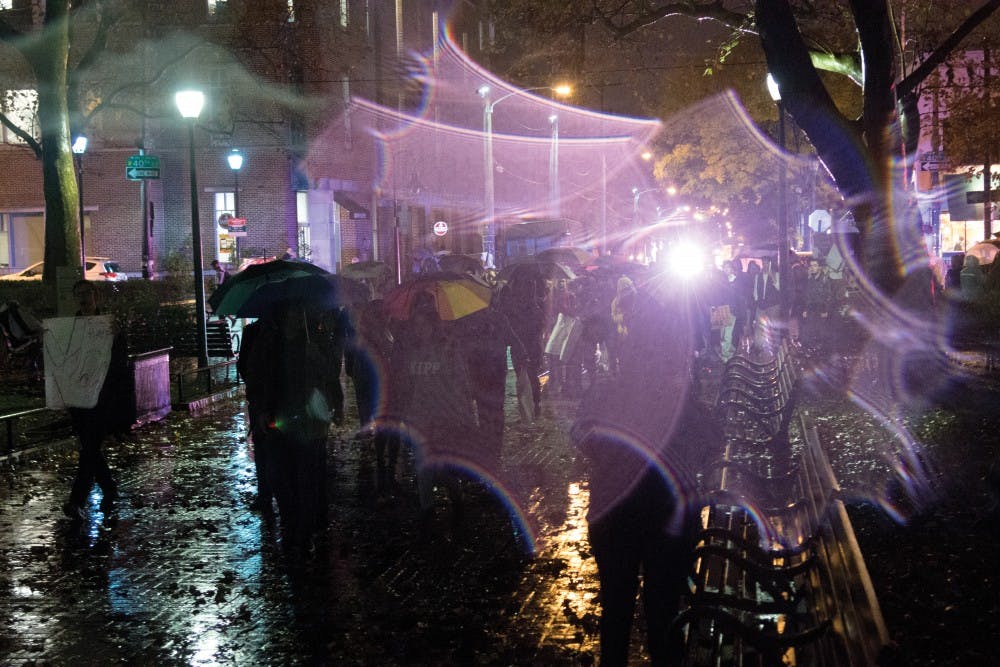
An America with president-elect Donald J. Trump at the helm began amid rain and protest at Penn on Wednesday.
Around 6 p.m., hundreds of Penn students and staff filled up College Green. Some of them were carrying umbrellas, others stood out in the rain drenched; all had gathered for a solidarity walk organized in response to Trump’s victory.
The event, which was co-organized by 23 student groups, began with opening remarks by College senior and We are Watching Co-Founder Syra Ortiz-Blanes and Chair of the United Minorities Council and Wharton senior Temilola Ransome-Kuti. Associate Vice Provost for Equity and Access Rev. William Gipson, who marched with students, also made a short speech.
“I want to make a distinction between disappointment and defeat,” Gipson said in his speech. “And for those of us who love freedom, we will never be defeated.”
Gipson said later in an interview that this election has been characterized by “assaultive rhetoric” that makes many students feel unsafe. He felt it was important to attend the march to “assert the full humanity” of all students on campus.
Police cars followed marchers along Walnut Street as they chanted “Not my president” — the same slogan chanted by protesters in Berkeley, Calif. yesterday — and held up signs that read “Love trumps hate.” College freshman Mihal Zelenin was among those who had gone to the Kelly Writers House hours before before the march to make signs.
“Right now, I just really need to be around people. I’m just grieving,” she said.
Wharton junior Jennifer Hutchens and Engineering junior Allison Caramico agreed, saying that they spent election night crying with members of their sorority. Waking up this morning, they felt that the only way they could keep themselves from breaking down again was to take action by joining the walk, Hutchens said.
Organizers also said one of the central goals of the march to was to provide a space for a collective healing after such a divisive election.
“There were visions of this [event] being a form of organizing, but really, it was about healing because you can’t do any work if you’re not whole, and if you’re not recovered,” said Penn Association for Gender Equity Chair and Wharton senior Megan Yan.
Preparation for this walk had begun even before election results were announced. Leaders from the 23 organizing groups had worked through election night, reaching out to administrators and local businesses to arrange for the event.
Many students like Zelenin said they attended the walk to heal, not to express anger, though a palpable sense of outrage was present during the march itself. When a passer-by on Walnut Street waved a “Make America Great Again” hat at students, many shouted back “Go f—k yourself.” When marchers turned onto Locust Walk, one section of students chanted “Smash the fascist,” and “Fascist Trump has got to go.”
However, as attendees turned into Houston Hall for a speak-out, the mood of the march changed. Chants of “Stronger together, solidarity now” echoed through the Hall of Flags, setting the tone for the next two hours where students came up to a microphone to share their stories, various times through sobs.
Many administrators were present at the speak-out including staff from the cultural center, Counseling and Psychological Services as well as the Vice Provost for University Life, Valarie Swain-Cade McCoullum.
Despite the tears, the sentiment that seemed to prevail at the speak-out was an appeal for hope and strength. Students ended their speeches by calling on each other to organize and work against discrimination in their personal lives. College junior Sean Collins called on those with privilege to protect those who did not.
He ended his speech by telling attendees, “If no one has told you that they love you today, I do.”
The Daily Pennsylvanian is an independent, student-run newspaper. Please consider making a donation to support the coverage that shapes the University. Your generosity ensures a future of strong journalism at Penn.
Donate






